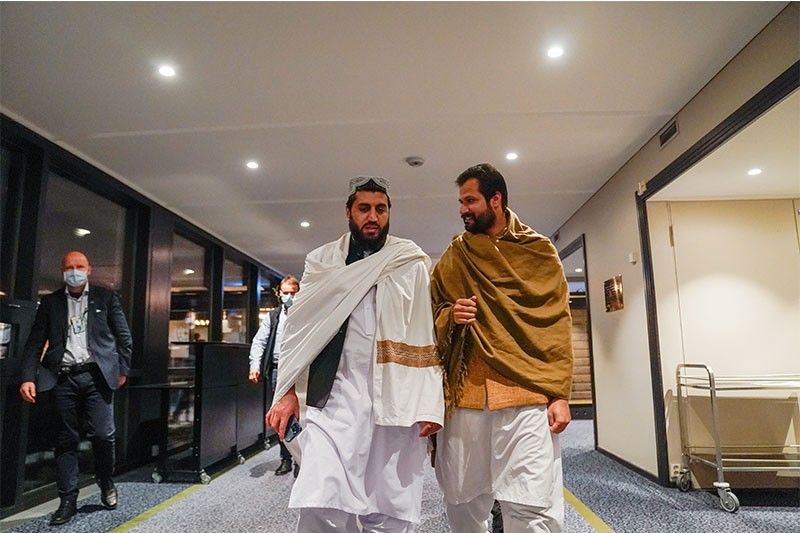Taliban, Afghan civil society 'break the ice' in Oslo

OSLO, Norway — Talks in Oslo Sunday between the Taliban and Afghan civil society members served as an "icebreaker", on the eve of their meeting with Western diplomats to discuss human rights and the humanitarian crisis in Afghanistan, an Afghan participant said.
The first Taliban delegation to visit Europe since the hardline Islamists returned to power there, led by Foreign Minister Amir Khan Muttaqi, spent the first day of their three-day visit talking with women activists and journalists, among others.
"It was a positive icebreaking meeting," feminist activist Jamila Afghani told AFP. The negotiators "displayed goodwill... Let's see what their actions will be, based on their words", she added.
Taliban spokesman Zabihullah Mujahid, in a tweet, said: "All Afghans need to work together for better political, economic and security outcomes...
"The participants... recognised that understanding and joint cooperation are the only solutions."
The closed-door discussions, facilitated by Norway, are being held at the Soria Moria Hotel, on a snowy hilltop outside Oslo.
Afghanistan's humanitarian situation has deteriorated drastically since last August when the Taliban stormed back to power 20 years after being toppled.
International aid came to a halt, worsening the plight of millions of people already suffering from hunger after several severe droughts.
Protests outside ministry
The hardline Islamists were ousted by a US-led coalition in 2001 but took over again following a hasty withdrawal by international forces.
No country has yet recognised the Taliban government, and Norwegian Foreign Minister Anniken Huitfeldt stressed on Friday that the talks would "not represent a legitimisation or recognition of the Taliban", but that country's humanitarian crisis had to be addressed.
Several dozen people protested outside Norway's foreign ministry on Sunday, an AFP journalist at the scene reported.
One of them, Shala Sultani, said the talks were tantamount to "laughing in the face" of Afghans who have lost family members. "You do not talk to terrorists," she said.
On Monday, the Taliban will meet representatives of the United States, France, Britain, Germany, Italy and the European Union. On Tuesday they will talk with Norwegian officials.
Thomas West, the US special representative for Afghanistan, tweeted on Sunday: "As we seek to address humanitarian crisis together with allies, partners, and relief orgs, we will continue clear-eyed diplomacy with the Taliban regarding our concerns and our abiding interest in a stable, rights-respecting and inclusive Afghanistan."
Joining the delegation from Kabul is Anas Haqqani, a leader of the most feared and violent faction of the Taliban movement –- the Haqqani network, responsible for some of the most devastating attacks in Afghanistan.
He was jailed for several years at the United States' Bagram detention centre outside the capital Kabul before being released in a prisoner swap in 2019.
'Collective punishment'
International aid financed around 80 percent of the Afghan budget until it was halted in August, and the United States has frozen $9.5 billion in assets in the Afghan central bank.
Unemployment has skyrocketed and civil servants' salaries have gone unpaid for months.
Hunger now threatens 23 million Afghans, or 55 percent of the population, according to the United Nations, which says it needs $4.4 billion from donor countries this year to address the humanitarian crisis.
"It would be a mistake to submit the people of Afghanistan to a collective punishment just because the de facto authorities are not behaving properly," UN Secretary General Antonio Guterres said Friday.
The international community is waiting to see how the Taliban intend to govern after being accused of trampling on human rights during their first stint in power between 1996 and 2001.
While the Islamists claim to have modernised, women are still largely excluded from public-sector employment and most secondary schools for girls remain closed.
'Gender apartheid'
A former Afghan minister for mines and petrol who now lives in Norway, Nargis Nehan, told AFP she had declined an invitation to take part.
She said she feared the talks would "normalise the Taliban and... strengthen them, while there is no way that they'll change."
Two women activists disappeared this week, seized from their homes in Kabul after taking part in a demonstration.
Davood Moradian, the head of the Afghan Institute for Strategic Studies now based outside Afghanistan, criticised Norway's "celebrity-style" peace initiative.
Hosting the Taliban's foreign minister "casts doubt on Norway's global image as a country that cares for women's rights, when the Taliban has effectively instituted gender apartheid," he said.
Norway has played a mediating role in many conflicts, including in the Middle East, Sri Lanka and Colombia.
Get the latest news as Taliban gains control of Afghanistan. Photo courtesy of Al Jazeera/AFP
Afghanistan's supreme leader said Sunday the country's women were being saved from "traditional oppressions" by the adoption of Islamic governance and their status as "free and dignified human beings" restored.
In a statement marking this week's Eid al-Adha holiday, Hibatullah Akhundzada -- who rarely appears in public and rules by decree from the Taliban's birthplace in Kandahar -- said steps had been taken to provide women with a "comfortable and prosperous life according to Islamic Sharia".
The United Nations expressed "deep concern" last week that women were being deprived of their rights under Afghanistan's Taliban government and warned of systematic gender apartheid.
Since returning to power in August 2021, Taliban authorities have stopped girls and women from attending high school or university, banned them from parks, gyms and public baths, and ordered them to cover up when leaving home.
They have also barred them from working for the UN or NGOs, while most female government employees have been dismissed from their jobs or are being paid to stay at home.
However, Akhundzada said "necessary steps have been taken for the betterment of women as half of the society".
"All institutions have been obliged to help women in securing marriage, inheritance and other rights," his statement read. — AFP
UN chief Antonio Guterres will gather international envoys at a secret location in Doha on Monday in an increasingly desperate bid to find ways to influence Afghanistan's Taliban rulers. — AFP
The UN Security Council adopted a resolution Thursday calling on Taliban authorities to "swiftly reverse" all restrictive measures against women, condemning in particular its ban on Afghan women working for the United Nations.
The resolution, unanimously adopted by all 15 Council members, said the ban announced in early April "undermines human rights and humanitarian principles."
More broadly, the Council called on the Taliban government to "swiftly reverse the policies and practices that restrict the enjoyment by women and girls of their human rights and fundamental freedoms."
It cited access to education, employment, freedom of movement, and "women's full, equal and meaningful participation in public life."
The Council also urged "all States and organizations to use their influence" to "promote an urgent reversal of these policies and practices." — AFP
G7 foreign ministers on Tuesday demanded the "immediate reversal" of a ban on women in Afghanistan working for non-governmental organisations and the United Nations.
"We call for the immediate reversal of unacceptable decisions restricting human rights and fundamental freedoms, including the latest bans prohibiting Afghan women from working for NGOs and the UN," the top diplomats said in a statement after two days of talks in Japan.
The group also slammed the Taliban authorities' "systematic abuses of human rights of women and girls and discrimination against the members of religious and ethnic minorities".
Taliban authorities triggered international outrage this month after extending a December ban on Afghan women working for non-governmental organisations to include the UN.
They have rejected criticism over the move, saying it is an internal issue that should be "respected by all sides." — AFP
The United Nations is being forced to make an "appalling choice" over whether to continue operations in Afghanistan while the Taliban government bans women from working for the organisation, the world body says.
Under their austere interpretation of Islam, Taliban authorities have imposed a slew of restrictions on Afghan women since seizing power in 2021, including banning them from higher education and many government jobs.
In December, they banned Afghan women from working for domestic and foreign non-governmental organisations, and on April 4 extended that to UN offices across the country.
In a statement Tuesday, the UN mission in Afghanistan said the ban was "unlawful under international law, including the UN Charter, and for that reason the United Nations cannot comply".
"Through this ban, the Taliban de facto authorities seek to force the United Nations into having to make an appalling choice between staying and delivering in support of the Afghan people and standing by the norms and principles we are duty-bound to uphold," it said. — AFP
- Latest
- Trending



































